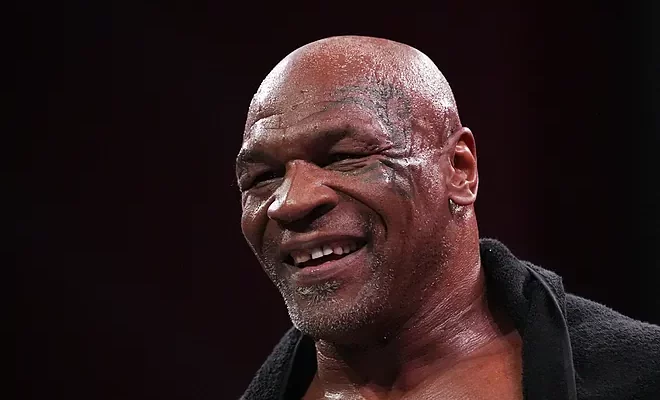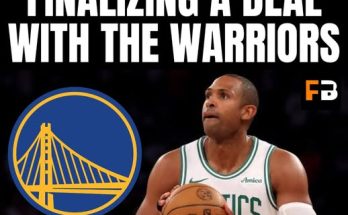When Mike Tyson speaks, the world listens—whether he’s talking about boxing, business, or, as it turns out, basketball. So when “Iron Mike” Tyson recently made headlines for naming Michael Jordan as basketball’s ultimate legend, it didn’t take long for fans across generations and social media platforms to rally behind his declaration. Tyson, a man whose own legacy is etched in stone within the annals of boxing history, knows greatness when he sees it. And in a world where debates over basketball’s G.O.A.T. seem endless, his straightforward, passionate endorsement of Jordan resonated deeply with many who grew up watching “His Airness” dominate the hardwood.
Tyson’s admiration for Michael Jordan is nothing new. The two legends of their respective sports have been photographed and seen together over the years, their mutual respect obvious in public interactions. But Tyson’s recent comments went beyond mere compliments; they were a passionate declaration that, in his eyes, Jordan is the pinnacle of basketball excellence—someone whose achievements, drive, and charisma embody what it means to be truly legendary. Tyson praised Jordan’s intensity, killer instinct, and will to win, describing those qualities as being unmatched in the sport. And coming from Tyson—a man who once ruled the boxing world with his own aura of invincibility—that’s a serious endorsement.
Fans were quick to latch on to Tyson’s proclamation. Across social media platforms, threads exploded with supportive messages from basketball enthusiasts, former players, sports analysts, and everyday fans who had either witnessed Jordan’s greatness firsthand or grown up watching his highlights on YouTube. There’s something about Tyson—raw, unfiltered, and brutally honest—that makes his words feel authentic. And for many, his declaration cut through the endless noise of debates comparing Jordan to LeBron James, Kobe Bryant, and others. It brought clarity to what many already believed: that Michael Jordan remains the ultimate icon of basketball.
Tyson’s perspective struck a chord especially with fans who experienced the Jordan era in real time. To them, Jordan wasn’t just a dominant athlete—he was a cultural phenomenon. He revolutionized the game with his gravity-defying dunks, ruthless competitiveness, and six NBA championships. He wasn’t merely winning; he was redefining what excellence looked like on a basketball court. Tyson highlighted those exact qualities in his commentary, saying that Jordan’s presence demanded respect not only from fans but from teammates, opponents, and the league itself. In Tyson’s words, Jordan was “a beast in human form,” and that animalistic drive was something Tyson could relate to as a former world champion.
Perhaps what resonated most with fans was the respect one legend was giving another. Tyson’s comments weren’t made in a dismissive tone toward other greats but rather as an elevation of someone he saw as peerless. In sports, it’s rare to find consensus. Whether it’s Serena Williams versus Steffi Graf, Tom Brady versus Joe Montana, or LeBron James versus Michael Jordan, fans often divide themselves into passionate camps. But when Mike Tyson, a man who understands the mental toll of competition and the sacrifices it takes to reach the pinnacle, says Jordan is the greatest, it feels less like a debate and more like a coronation.
Supporters of Tyson’s comments also pointed to the broader influence Jordan had on and off the court. While his basketball skills are undeniably elite, what truly separates Jordan in the minds of many is his cultural and commercial impact. Tyson acknowledged this as well, noting how Jordan’s name became synonymous with excellence. The Air Jordan sneaker line is still one of the best-selling shoe lines decades after his retirement. His presence still looms large in NBA arenas, in sports marketing, and in conversations about greatness. Jordan made basketball global, much like how Tyson, at his peak, brought a new level of global attention to heavyweight boxing.
Younger fans, some of whom weren’t alive during Jordan’s NBA reign, found Tyson’s comments to be educational and affirming. In an age where LeBron James dominates headlines and social media buzz, it’s easy to forget how dominant and awe-inspiring Jordan was. Tyson’s perspective offered a reminder that greatness isn’t just about statistics—it’s about dominance, fearlessness, and influence. He didn’t rattle off numbers. He didn’t talk PER, win shares, or advanced analytics. He spoke from the gut, from a place of reverence and respect, and that emotional conviction is what made his opinion so powerful.
The rallying of fans around Tyson’s declaration also highlights how timeless Jordan’s appeal is. Even in retirement, even in an era dominated by newer stars, his legend remains unshaken. People still watch “The Last Dance” documentary on repeat. They still wear his jerseys, buy his shoes, and imitate his moves on blacktops and in video games. Tyson’s recognition of Jordan as the ultimate basketball legend served as a kind of reminder, a clarion call to remember why Jordan became the gold standard in the first place. It was like a generation being reawakened to the greatness that had become, for some, a bit buried under layers of recency bias.
There’s also a deeper psychological element to Tyson’s comments that fans appreciated. Tyson has always been transparent about the mental and emotional challenges of fame and pressure. He knows what it’s like to be expected to win every time, to have the weight of a sport on your shoulders. So when he speaks about Jordan’s ability to consistently deliver in the biggest moments—NBA Finals, clutch shots, game-winning performances—he’s speaking from experience. Tyson wasn’t just calling Jordan the best because of rings or MVPs. He was saying it because he understood the internal toughness it took to carry that kind of burden, and to thrive under it, year after year.
As the sports media world picked up on Tyson’s comments, debate shows and podcasts lit up with renewed conversations about Jordan’s place in history. But interestingly, most of the attention wasn’t on challenging Tyson’s opinion—it was on amplifying it. Analysts revisited Jordan’s iconic performances, from the “Flu Game” to his final shot as a Chicago Bull. Former players echoed Tyson’s sentiment, with many agreeing that Jordan’s competitive fire was unlike anything they had ever witnessed. It wasn’t just nostalgia. It was reverence for a figure whose impact transcends the sport itself.
In many ways, Tyson’s remarks served to remind the sports world that greatness isn’t always quantifiable. Sometimes, it’s about the feeling a player gives you—the awe, the intimidation, the magic. For Tyson, and for the millions of fans who rallied behind him, Michael Jordan embodies all of that and more. He was a showman, a winner, a cultural force, and a relentless competitor. And when another titan of sport like Mike Tyson acknowledges that, it becomes less a personal opinion and more a generational truth.
Ultimately, Tyson’s declaration was more than a soundbite. It was a cross-sport moment of admiration that united fans and rekindled appreciation for a player who redefined what basketball could be. Fans saw Tyson, a man who has faced giants, known fear, and conquered it, look at Jordan and say, “That’s the ultimate legend.” And in that moment, all the noise faded. The stats, the comparisons, the hot takes—they didn’t matter. What mattered was one icon recognizing another and the collective voice of fans nodding in agreement, reminded once again why Michael Jordan isn’t just a legend in basketball—he’s the legend.



